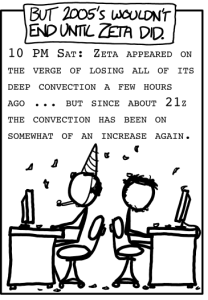
Excerpt of XKCD, by Randall Monroe https://xkcd.com/1126/ Note that this is a guess at what New Years Eve at the National Hurricane Center looked like in 2005.
It’s hard to overlook the weather, but weather forecasters are another matter.
Consider the time my husband and I had to take shelter in the guest bathroom–we’d gotten a warning of a possible tornado (my husband is a firefighter/EMT, and his pager also does emergency alerts). Besides our pets and my laptop (I have unfinished novels on there I really don’t want flung off into the Land of Oz) we brought only one more item in with us—the cell-phone. We needed the cell so we could get online and find out when it was safe to come out. I have a vague memory that we were not watching an automatic builtin, that there was a human being in evidence discussing whether or not the warning would be allowed to expire, but neither of us can remember who that person was.
The one person we needed to hear from while huddled with our pets in the bathroom in the middle of the night was a meteorologist, and we don’t remember who it was.
(Was there a tornado? We don’t know. We heard a very odd noise from off to our west, and later we learned of some odd damage in that direction, too. But no tornado in our area was mentioned the next day on the news. I sent in our observation, but I don’t know if the message was received. Anyway, yes, we’re OK, thank you)
Of course, weatherpeople are journalists, and journalists don’t usually draw attention to themselves—the idea is to focus on the message, not the messenger. But when people do good and necessary work on our behalf, it’s important to notice.
For Example….
Consider our local weatherman, Dan Satterfield.
He is currently Chief Meteorologist for WBOC TV, in Salisbury, Maryland, though he has also served elsewhere in the course of his almost 40-year career. While I can’t be sure it wasn’t him we were listening to on the cell that night, I have learned to notice him. He is, in a word, good.
I appreciate that he sometimes explains his judgment calls on air—I like learning a little of what goes in to making those predictions. He takes the time to explain odd things that turn up on the radar images (big flocks of migrating birds!), too. People send in photos of weird clouds and he spends a good minute happily geeking out on camera. When pointing out an unusually high temperature in the Southwest, he’s been known to comment “Today would not be a good day to be standing on the corner of Winslow, Arizona.”
Of course, what really got my attention is that he sometimes mentions climate change on air. Not a lot of people do.
The great thing about having a blog, I realized the other week, is that if there’s a public figure I want to ask a couple of questions of, I have a legitimate excuse.
The Interview
The “interview” consisted entirely of emailed questions and answers. This being the Era of Covid-19, there was no question of meeting in person, and communicating in writing does simplify note-taking.
I’ve changed the order of the questions and interjected with a comment in places, but the quotes from Mr. Satterfield have not been edited.
How and why did you get into meteorology?
I loved weather from the time I can remember, but seeing a tornado on June 8,1974 in Oklahoma City was the thing that solidified it. Before that I had gotten a weather kit for Christmas and I wore it out! Over the years, my friends who are meteorologists all have similar stories. We seem to have been born with the love of the sky. At university I learned a love of the maths and physics that describe how it all works.
My ecologist friends probably all have equivalent stories, too. I wonder if all branches of science are rooted in love? I wouldn’t be surprised.
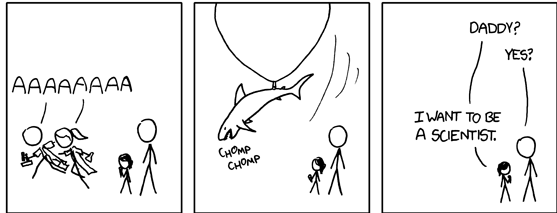
Excerpt from XKCD, by Randall Monroe, https://xkcd.com/585/
Also, yes, that last sentence of his is British usage. Mr. Satterfield talks like an American, but evidently writes like a Brit. On the About page of his blog, he even admits that London is his “favourite” non-Arctic place. He doesn’t explain the discrepancy, but someone who sees a tornado and goes “yes! more of that please!” doesn’t really have to explain himself, does he?
Does studying weather give you insight into climate? If so, can you give examples?
Meteorology and climatology are cousins. Climate is what you expect and weather is what you get! Understanding climate change though requires a good knowledge of atmospheric physics.
Excerpt from XKCD, by Randall Monroe https://xkcd.com/863/
Understanding the greenhouse effect requires an understanding of the Maxwell equations. There were things I had not been taught that I’ve had to learn, and a lot of statistics that I was not up to speed on as well. Meteorologists have the basics to understand climatology but it is a separate field and I often have to ask questions of my climate scientists friends. Climate change is really fascinating though, and I have friends who went back and did a masters in climate. I did a masters in Earth Sci. because I love all of the subjects from Geology to Astronomy! If I could live three lives, I’d do one as a geologist and one as an astronomer, besides this one!
Ah, love again! As for a multiplicity of interests, as an undergrad, I studied a mix of environmental science and psychology for a similar reason.
Given that everybody starts out knowing nothing, and some people grow up to trust the expertise of scientists and the validity of the scientific process while others don’t, how did you end up in the first category? Why didn’t you grow up to be a climate denier?
I didn’t grow up to be a climate denier because I was lucky enough to have a good science education. An education that taught me critical thinking skills and an understanding of how science works.
Scientists are (and should be) naturally skeptical, and I was certainly skeptical about the science of climate change at the beginning. I knew how difficult it was to model the atmosphere and I had real doubts about the climate models that forecasted such dramatic warming. When, I started asking questions at conferences and looked more deeply at it, I soon saw the flaw in my early ideas.
This lead me to dive even more deeply into the subject. Climatology and Meteorology are cousins, but I needed to learn more. I knew not to pay attention to the junk science on the internet, so I looked at the published papers, and it became obvious that the science was absolutely overwhelming. I was embarrassed for some of my fellow broadcast meteorologists who were publicly repeating things that were just not true.
Let me jump in here and say this part is crucial. The question was part of a larger train of thought that has also emerged on this blog here and here and here, but usually when people talk about the value of science education what they seem to be talking about is content–being told that climate change exists, for example. Seen that way, science resembles a dogma or an orthodoxy. How do you decide whose orthodoxy to believe? But that’s not what science is, and that’s not what Mr. Satterfield meant–his good science education did not include climate change, after all. Instead, it equipped him with the means to identify the topic as one worthy of a closer look, and the means to identify reliable sources of information. Science isn’t a set of answers–it is a way to ask questions.
OK, back to the interview.
It was about this time that I decided to create a blog and a facebook page. Someone needed to step up and point out what the science was saying, and why the myths floating around social media were wrong.
I was not alone, several of my friends who worked in other cities did the same. Jim Gandy in Columbia, SC, John Morales in Miami, Paul Gross in Detroit. Many of us were in areas that were hot beds of climate denial, but we did it anyway. We had the science on our side, so I knew we would be right in the end.
I did get some flack from viewers but I was prepared for it. I still do from time to time but those who think it’s a hoax are members of a rapidly dwindling group. They are looked at no differently than other conspiracy theory believers.
A broadcast meteorologist like me is for many the only person with a science background the average person sees on a daily basis. It is very important to me that I give them good information and correct bad information that may be out there.
You make a point of talking about science not politics, but you do cover science topics that have political import, and you’re clearly not afraid to call out idiots and liars on occasion. So how do you handle the risk that you might be accused of political bias?
If I’m going to communicate science then I must do it even when it is politically unpopular. That is likely when it’s MOST important. Not covering something because it will make my viewers mad or I will lose followers is not ethical journalism. I wear two hats in my job and I must follow the ethics of both fields. I can tell you there are a lot of broadcast meteorologists who have chosen the other way. There are stations who even forbid their meteorologists from talking about climate change. This is without doubt journalistic malpractice and may very well be a form of yellow journalism.
What we do about climate change is a policy question. The threat and how serious it is to those of us who live on this planet is the science question. I try hard to stay in that realm. Sometimes it is hard though. The incident with the hurricane and the NWS office in Birmingham was BOTH political and science based. There was no doubt that the NWS was right, and it was absolutely fair game. I wrote about it on my blog and posted on Facebook and Twitter about it, and received a few rather ugly comments.
Here is the relevant post, by the way, the one explaining the incident with the hurricane. And if you want to know where my “clearly not afraid to call out idiots and liars” comes from, click here. It’s quite refreshing.
Does the fact that you’re talking to Delmarva influence how you present information? For example, the region tends to be politically conservative, and certain anti-scientific biases tend to skew conservative while others skew liberal. Do you keep the specificity of your audience in mind? Why/why not?
The political beliefs of my audience play no role in what I post and never will. If a lot of folks believe something that is not true, I will likely cover it.
I actually have a broad audience on my blog and on my Facebook/Twitter. That said, many are from here on Delmarva and many from where I worked in North Alabama. When I created my blog and my Facebook page, I made a conscious decision that they would be mainly about Earth Science. If what I posted about was politically unpopular, then so be it. Science is science, but I am careful to get it right. The very fact that I had to worry about this is evidence of the need for good science communication.
Excerpt from XKCD by Randall Monroe https://xkcd.com/154/
Over the years, I have talked about climate change, evolution, vaccines, and many other subjects. I will not ignore a subject because it may be unpopular. If anything, those are subjects that cry out for some solid science. I have received hate mail for saying a rock is 200 million years old from someone who insisted it was 6,000. That is not going to stop me from talking about geology or the age of the Universe.
When a guy came to Huntsville trying to sell a device that would get people 100 miles to the gallon by making hydrogen from a tank of water in their trunk, I called it out on-air, and got a ton of hate mail too! I pointed out that this violated the second law of thermodynamics, but the emails and letters kept coming in. They almost all told me to “stick to the weather”.
Recently I have posted a lot about Covid19. I know little about the subject of virology but I do know how to gather information from those who do. It is vital that the public gets reliable information on this disease and believe me there is a LOT of crazy floating around online. It’s fair game therefore.
When I post something that conflicts with someones worldview, I often get irate responses, but that just tells me that this information is important to put out there. I think there has never been a more important time to communicate good science. We actually have people who doubt germ theory and think the Earth is flat. These are indeed scary times.
These are scary times, yes. But I find it interesting to compare Mr. Satterfield’s approach to that of a number of authors, notably Sarah Jaquette Ray, whose book, A Field Guide to Climate Anxiety, I reviewed some weeks ago. These people advocate a more persuasive, more emotional approach, citing evidence that facts and figures do not convince climate deniers and may actually be counter-productive. I don’t doubt the relevance of such evidence–humans are notoriously irrational creatures at times–and I’m happy to harness the power of psychology to craft better communication. But it’s a mistake to take these ideas further, as some do, and blame sciency science communicators (and stridently active activists) for creating climate denial. It’s as if they spotted someone paddling madly upstream and shouted “you’re getting nowhere–you must be paddling too hard!” We can’t forget that we have adversaries.
The other reason “stop being so sciency” is a mistake is that I have anecdotal evidence that simply providing information can work.
Some years ago, back when I had a job that included explaining natural history to the public in person instead of only in writing, I fell to talking with an older woman near the shore of a pond in Vermont. She asked me several questions about the behavior of the local beavers–she’d noticed water-level fluctuations, signs of feeding activity, that sort of thing–and since I’d recently re-read a favorite book that had a chapter on beavers, I more or less recited the relevant chapter for her. After chatting about beavers with me for a while she paused, looked at me, and asked “do you believe in climate change?”
Because I had shown myself a reliable source of information, she believed me when I told her climate change is real.
May his audience believe Dan Satterfield.
Why I Asked for the Interview
OK, I admit that when I asked for the interview, I didn’t know why. I had an impulse, and I followed it. But I’ve noticed that certain of my impulses tend to be wise–there is indeed a very good reason, I just don’t know what it is, yet.
In this case, I started to get a glimmer of the reason for the interview only when I wrote the introductory paragraphs. It took me a while to hit on the right framing, but when I typed out when people do good and necessary work on our behalf, it’s important to notice, the lightbulb went off.
Because yes, it’s important to notice people in general, that’s part of being human to each other, but it is particularly important to notice experts doing a good job–so that they can keep doing it.
I think Mr. Satterfield’s job is more than secure. He has an actual fan base. But as he points out, there are people unwilling to take the risks he does, and there are places unwilling to employ the risky. If, say, some little TV station somewhere quietly decided to replace a principled and intellectually passionate meteorologist with one who was less so, would there be an outcry?
What about other kinds of experts who unobtrusively make the world work? Like, what about whoever’s giving medical advice to my state’s governor during the pandemic? What about the people who give teeth to our remaining environmental regulations by denying permits? What about the whole staff one of the few remaining locally-owned independent newspapers?
The point is there are these experts we depend on, and some of them are vulnerable. We don’t live in an age particularly friendly to expertise. Even those who don’t have political problems can easily fall victim to budget cuts, to the pressure to get everything done cheaply never mind the cost. We need to get in the habit of paying attention to, and finding out about these folks. That way, if they vanish or get muzzled somehow, we’ll be able to say something.
Start by noticing who is talking about tornadoes in the middle of the night in the guest bathroom.

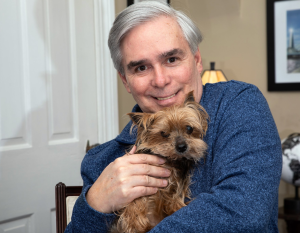
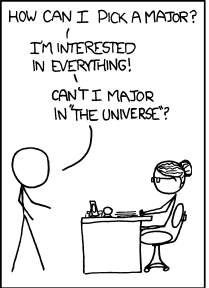
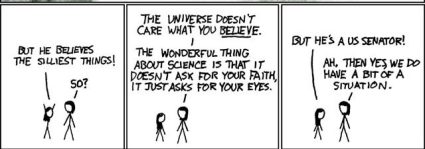
July 8, 2020 at 2:15 am
Dan was in Huntsville, AL when my kids were young. I always turned to him in the event of severe weather. He always took time to talk to kids that may have been home alone. Explaining step by step what they should do. I learned so much watching him. I’ll always respect his opinion.
July 8, 2020 at 2:41 am
He is a treasure. His blog is excellent, too.
July 8, 2020 at 4:09 am
Caroline Ailanthus
Great article about a wonderful person, scientist and meteorologist!
I had the pleasure of getting to know the Satterfield family when they lived here in Huntsville. My son interned under Dan at the TV station where Dan worked and this was a dream come true for my son. I came to rely on his weather, climate and scientific knowledge. He was such an asset to everyone here and children loved him. Adults depended on him. We still do actually. If bad weather is in the forecast, I and many others still seek out Dan’s take on what is happening around us with the weather. A true testament to the kind of person Dan is…the fact that he takes the time to study the radar, check the charts, etc and reach out to us here because he cares and he knows we are looking to him still to keep us informed. He doesn’t have to do that, we are not part of his current viewing audience that has also grown to rely and value his guidance; but he does. That is a testament to the kind of person Dan Satterfield is. The world needs more people desperately like Dan. Thank you for sharing him with your readers. In time, they too will figure out what a gift they have been given, if they haven’t already.
July 15, 2020 at 12:11 pm
I think they’ve figured it out! When I decided to ask him for the interview, I knew I was a fan, but I didn’t know everybody else was, too–the visitation numbers for my blog absolutely blew up! Turns out he’s like the David Attenborough of broadcast meteorology….I have no idea what Delmarva did to deserve him.
July 8, 2020 at 4:19 am
We miss Dan in Alabama. He was always my go to – and I listened to him many times during a tornado. He was the only one I would listen to. I was so glad when I found him on Facebook and love the science he shares. I know I can trust that he has done the research. Thanks for everything, Dan!
July 15, 2020 at 12:03 pm
Yes, it may well have been him we listened to during that tornado–it was certainly him I reported the odd sound and weird damage pattern to, though I don’t know if he got the message, something I wouldn’t have thought to do for any other weatherperson. But listen, he read the post before your comment was on it, as far as I can tell, so if you want to thank him you’ll have to contact him directly. On another note, I hope you’ll continue reading my blog, as I cover similar territory.
Pingback: On Defending Expertise, Part I | The Climate in Emergency
Pingback: The Revolution Will Not Be Televised: At Least the Rotation Will Be. | The Climate in Emergency
Pingback: Waiting for the Hurricane | The Climate in Emergency
Pingback: Caring One Iota | The Climate in Emergency
Pingback: Changing Seasons | The Climate in Emergency
Pingback: The More Things Change…. | The Climate in Emergency
Pingback: Retrospective | The Climate in Emergency
Pingback: The Groundhog Cometh | The Climate in Emergency
Pingback: Hurricane Warning | The Climate in Emergency
Pingback: Smokey Joe’s Cafe | The Climate in Emergency